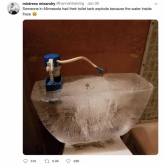Maast
Compulsive Tinkerer
What do you think the minimum sized system would be to keep the lights on, refrigerator running, and the furnace going while doing extreme conservation in the average Texan house? I did a quick set of calculations and assuming a gas furnace it came out surprisingly small inverter at only 3000W but with a large-ish 24kwh battery for 3 days of autonomy.
When I used a reversible 3 ton heat pump (as Texas is AC country vs furnace country) it jumped to 8000w (for startup surge) and a huge 70kwh battery bank.
Those numbers all just dont seem right though.
When I used a reversible 3 ton heat pump (as Texas is AC country vs furnace country) it jumped to 8000w (for startup surge) and a huge 70kwh battery bank.
Those numbers all just dont seem right though.



